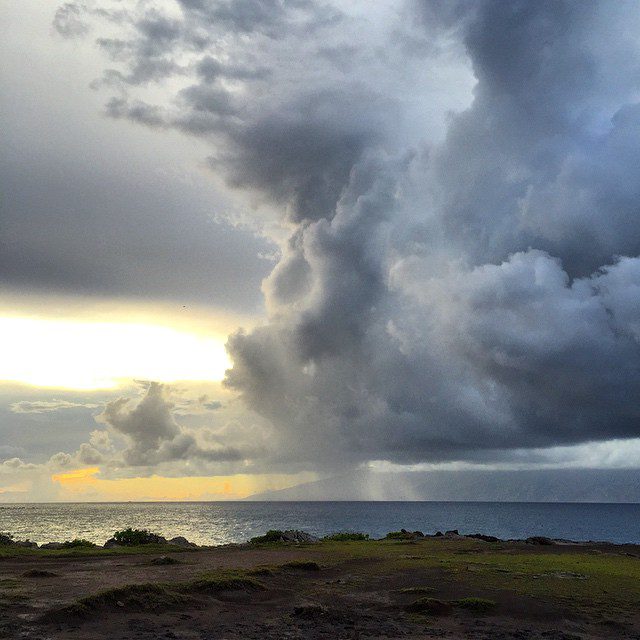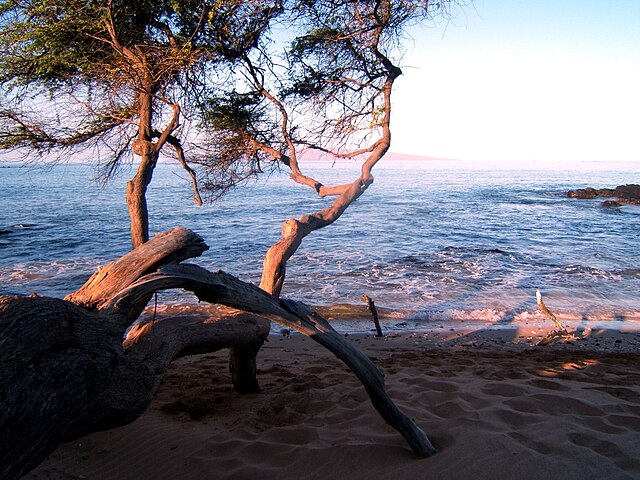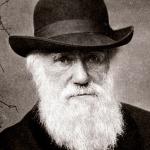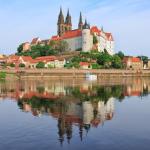
The local whale-watching people are very concerned. Apparently there are still reports on the internet that the August 2023 fire that destroyed most of Lahaina has put an end to whale watching here, in one of the best places in the entire world for observing whales. But it’s not true. And they’ve asked us to get the word out. False reports are hurting them, economically. So here I am, trying to get the word out.
We spent a substantial portion of Monday afternoon out in the Maui Nui Basin — that is to say, on the water between the islands of Maui, Lānaʻi, and Moloka‘i — in quest of the great white whale. Or, anyway, in quest of humpback whales. And our quest was highly successful, which isn’t surprising, since the current census of humpbacks puts their number in the area at roughly two thousand. They come here to give birth to their calves, and to mate. And, while the whale calves are nursing, the adults, both male and female, fast for the entire time that they’re here, since little or no food exists for them in the area. Their fast can continue for several months before they return to Russian waters or to the waters of Alaska and the Aleutian Islands. (They ignore the borders.) The whole thing is remarkable.
We were out with a group called Dive Maui. We saw whales spouting, breaching, slapping the water with their pectoral fins, teaching their newborns. We saw juveniles and mothers and “escorting” males. One mother and baby came up really close to our raft to take a good long look at us. They swam around us, up close to us, behind us.
Truth be told, I enjoy simply being out on a boat. I also really enjoy seeing wild animals in their native habitat. So does my wife, which is why we’ve done whale watching many times off of at least three of the Hawaiian Islands, as well as off the coast of Victoria, British Columbia; Depoe Bay, Oregon; and Dana Point, California. We wanted to go whale watching in Cabo San Lucas a bit more than a year ago, but the whale season wasn’t on there yet.
Curiously, though, I’ve never been interested in hunting. In this, my father and I amicably parted ways. In fact, we never even really talked about it; I simply didn’t pick it up. He grew up as a hunter in rural North Dakota, and, among other things, he and his brother participated every year in the annual Utah deer-hunting season. (As a child, I worried every year that he might kill Bambi.) He made sure that I was trained in the use of firearms and in gun safety — he had been a rifle instructor in the Army for a while — but, as I recall, he took me out hunting only once. For rabbits. I got off a pretty good shot that day and killed a rabbit, and I was inconsolable. I hated it. I could think of no good reason why, solely for my enjoyment, that rabbit should have been hopping happily along one moment and, in the next moment, die a violent death at my hand.
A few years ago, my wife and I went up into the Canadian Rockies with two other couples. One of the men that we were with is a very serious hunter, both with a rifle and with a bow and arrow. His collection of hunting trophies is impressive. One mid-morning during that trip, in Banff National Park, we came across a magnificent stag in a meadow. Our friend lamented that he had no rifle with him. I, in turn, marveled at that. The thought of killing so majestic a creature hadn’t so much as occurred to me and, on my own, would never have occurred to me. I don’t think any the less of our friend — any more than I thought less of my Dad — for his interest in hunting. He’s a really good man, in multiple respects a far better one than I am and certainly a more useful one. I was just amazed, in this specific regard, at how differently we seem to be wired.
I occasionally thought — never very earnestly — that I would have enjoyed taking up landscape and wildlife photography as a serious hobby. That kind of hunting and that kind of exploring out in nature I could have enjoyed very much. But not the kind with a gun or a bow and arrow.

With my wife’s sister, we visited a beautiful little cove on Sunday afternoon, over on the southwestern side of the island in the vicinity of Wailea. I was amused to find myself in conversation with an aging-hippie-looking fellow there who turned out to be a Lebanese-born physician. He had trained and practiced in France and French Switzerland for many years — his wife is French — and is now based in Boulder, Colorado (where his politics must fit right in, albeit on the leftward end of even the Boulder spectrum.) My sister-in-law mentioned to him that I do Arabic, so he immediately put me to the test with a super-Egyptian colloquial expression, wondering whether I knew it and whether I knew what it means. Happily, I passed the test. So there’s yet another person whom I’ve successfully fooled!

My friend Dr. Lynn Johnson forwarded to me what seem to be excerpts, gathered by Ken Pope, from Sanjula D. Singha, et al., “For brain health, one drink a day is not better than none,” in the eminent British medical journal The Lancet. It’s apparent that either Dr. Johnson or Ken Pope, or perhaps both, have been searching in the section of the Christopher Hitchens Memorial “How Religion Poisons Everything” File™ that pertains directly to the Latter-day Saints and their “Word of Wisdom”:
The Review of Evidence on Alcohol and Health from the US National Academies of Sciences, Engineering, and Medicine (NASEM) brings renewed attention to the possibility that moderate alcohol consumption might yield health benefits. The report’s meta-analyses found that moderate consumption was associated with reductions in all-cause mortality and cardiovascular disease-related mortality (including stroke- related mortality). When advising patients on the risks and benefits of moderate alcohol consumption, however, clinicians will do well to bear in mind three key considerations. First, study design: the meta-analyses described in the NASEM report rely on observational studies, which are constrained by confounding, reverse causality, and selection bias. Mendelian randomisation, which uses genetic variants to infer causal relationships, can bypass these limitations and consistently challenges the notion of health benefits from alcohol consumption at any dose, showing a linear relationship between alcohol consumption and all-cause mortality. Second, lived experience is of paramount consideration: the NASEM report evaluated a range of outcomes beyond mortality, including risk of heart disease, stroke, neurocognition, and cancers. Patients might prioritise some outcomes over others. The report states that insufficient evidence is available on any health benefits of moderate alcohol consumption for neurocognition and risk of dementia. When discussing the long-term effects of alcohol consumption with patients, we have found it helpful to focus on dementia, stroke, and depression, which collectively result in more than 9 million deaths and more than 200 million disability-adjusted life years per year, as well as an annual global economic burden exceeding US$3 trillion. The vast majority of adults have had personal experience, or know someone well who has had personal experience with dementia, stroke, or depression, giving meaning to the discussion. At present, the evidence supports recommending abstinence from alcohol to reduce risk of these conditions across the lifespan.
Posted from Kāʻanapali, Maui, Hawaiʻi













